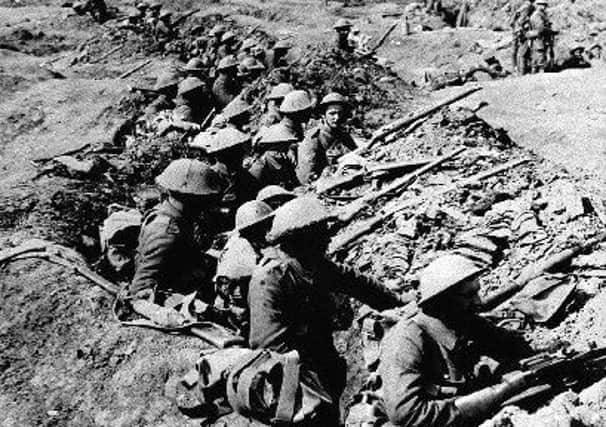Diaries of war are published on line


During the six-month Siege of Kut-al-Amara, British troops experienced starvation, a lack of ammunition and widespread disease - all of which led to eventual surrender in April 1916.
One hundred years on, the personal accounts of Lieutenant Henry Curtis Gallup’s gruelling mission are being published by the National Army Museum.
Advertisement
Hide AdAdvertisement
Hide AdFollowing Turkey’s entry into the war in 1914, Britain landed troops in Mesopotamia - modern day Iraq.
Britain needed to protect its oil supplies and the British command was confident that they could rally the Arabs by defeating Turkey.
Gallup’s unit, the Hampshire Howziter Battery, Royal Field Artillery, was sent to this unfamiliar land and ordered to advance some 250 miles (400km) into Mesopotamia, to Kut and then Baghdad.
By November 1915 the British forces had made good headway to Kut.
Advertisement
Hide AdAdvertisement
Hide AdTheir triumph was short lived though, as they quickly found themselves outnumbered and under intense pressure, having encountered relentless attacks from the Turkish forces.
Gallup’s diary entries detail how continuous Turkish offensives, and the insufferable conditions these ill-fated men had to endure, eventually wore down the exhausted British forces.
In one entry for November 21 to 23, he declares: “I was frightfully weary and utterly sick of the sound of rifle bullets.”
By December 1915 food supplies were desperately low and the prospect of starvation was looming in the months ahead - forcing the soldiers to eat their horses.
Advertisement
Hide AdAdvertisement
Hide AdBritain rallied its resources to relieve the beleaguered troops, sending two Indian divisions to Kut, but the relieving forces were halted by the enemy, with 23,000 casualties.
Extreme measures were taken to save the men, with a shipload of stores sent after dark, but it was captured by the Turks.
Gallup describes how “we can only picture to ourselves the heavenly feed the Turks must be having”.
He also explains how planes were frantically “dropping sacks of grain, parcels of chocolate, any old thing in fact to enable us to carry on for a few extra days”.
Advertisement
Hide AdAdvertisement
Hide AdGallup continues: “But however hard the planes worked it was a mightily small allowance that each person got; the planes of course were greeted by heavy fire from Turkish lines.”
Trapped and under siege from the enemy, while yearning for food, Gallup vividly details how the men were forced to eat horse mince, horse flesh and “Kabobs” made of flour and fried in horse fat to stay alive.
He was pining for substantial food and in his diary entries for March 27 and April 20, he writes: “I simply long for a piece of chocolate or a tinned apple pudding... It is extraordinary how the idea of food absolutely obsesses one when you can’t get any.”
By the end of April 1916, the Kut garrison was starving, sickness was rife, and with no prospect for relief, they surrendered on April 29.
Advertisement
Hide AdAdvertisement
Hide AdAround 13,000 men, including Gallup, marched into captivity where they faced “fleas”, “dirty water” and “cramped conditions”, which caused a third to die from disease, malnutrition and cruel treatment by the Turks.
Henry Curtis Gallup was born in Bloomsbury, London in 1874 and later moved to Sussex and then Wiltshire with his parents.
Upon volunteering for service, he was commissioned as a second lieutenant.
At the beginning of his service, Gallup was briefly hospitalised with jaundice and wrote home that “we are all very fed up with the war and heartily wish it was over”.
Advertisement
Hide AdAdvertisement
Hide AdLittle did he know the long journey ahead and unlike many, Gallup survived captivity and was repatriated at the end of the war.
He went on to become a major and died on November 3 1942 at Langstone Manor, Brentor, a village in west Devon.
The diaries and letters are being published by the National Army Museum’s commemorative online portal, First World War in Focus, as part of its Soldiers’ Stories series.
Dr Peter Johnston, from the museum, said: “Gallup’s diaries and letters offer a unique glimpse into the battles that are sometimes forgotten but are nevertheless important to British history.
Advertisement
Hide AdAdvertisement
Hide Ad“They allow us to understand what it was like to be a victim of war and the perils that came with it as well as the desire for home comforts, like chocolate, that added to the hardships faced by First World War soldiers.”
The Gallup diaries can be found at http://www.nam.ac.uk/microsites/ww1/stories/.